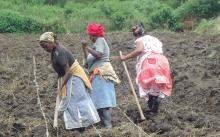Land Library
Welcome to the Land Portal Library. Explore our vast collection of open-access resources (over 74,000) including reports, journal articles, research papers, peer-reviewed publications, legal documents, videos and much more.
/ library resources
Showing items 1 through 9 of 56.New research by CCSI and the Centre pour l’Environnement et le Développement (CED) on transparency of land-based investment in Cameroon.
In the report, CCSI and CED find that:
Transparency is often seen as a means of improving governance and accountability of investment, but its potential to do so is hindered by vague definitions and failures to focus on the needs of key local actors.
This document provides practical guidance to address the taxation of Indirect Transfers of assets of extractive industries. It focuses on issues that developing country governments may wish to consider if they adopt a policy to tax such transfers.
This manual has been developed for training purposes. It models the gas value chain from the upstream project to the use of gas under the form of LPG, LNG or as feedstock for local industrial or power generation uses.
This paper provides guidance on how to integrate consultation and FPIC principles into investor-state contract negotiations to actively involve project-affected communities and better safeguard their land rights and human rights.
This guide aims to assist non-lawyers to better understand investment contracts that concern forestry projects. These "forestry contracts" can be complex, and some provisions may be difficult to understand.
Access to land is key to achieving food security, poverty alleviation, social equity and environmental protection. A brief insight in land governance-related principles and policies of the German development assistance.
Following the end of apartheid, South Africa’s government set itself ambitious goals with a planned land reform. However, there have since been barely any changes in the country’s agricultural structure, and the positive impacts that were hoped for on rural livelihoods have hardly materialised.
The year 2016 marks 15 years since the new wave land reforms became operational in Tanzania. Despite its ambitious goals – encouraging land registration and titling, and empowering women and other vulnerable groups – the results are disillusioning.









